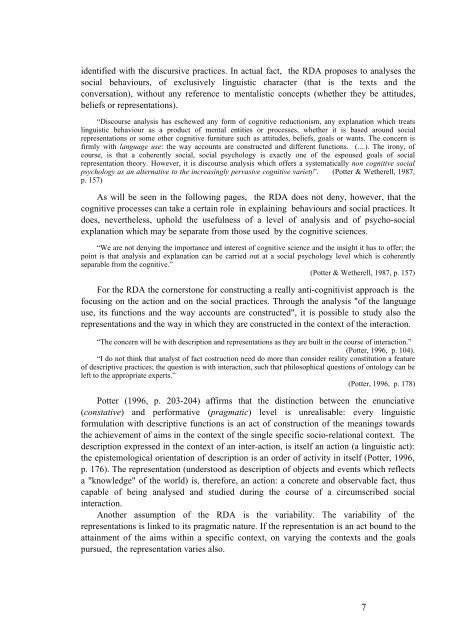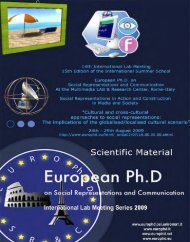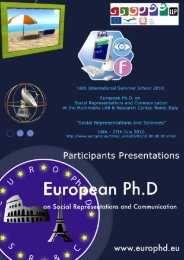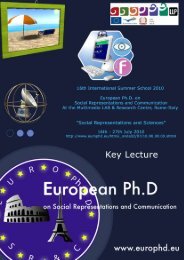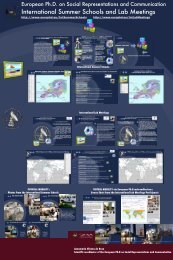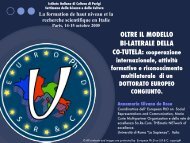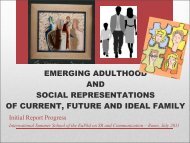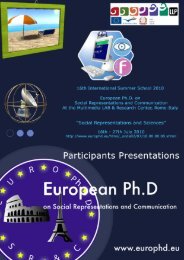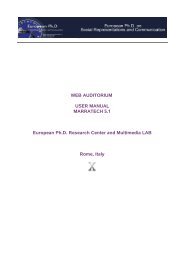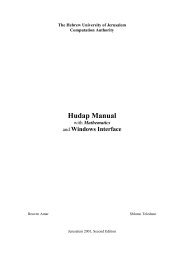The "boomerang" effect of the radicalism in discourse analysis
The "boomerang" effect of the radicalism in discourse analysis
The "boomerang" effect of the radicalism in discourse analysis
Create successful ePaper yourself
Turn your PDF publications into a flip-book with our unique Google optimized e-Paper software.
identified with <strong>the</strong> discursive practices. In actual fact, <strong>the</strong> RDA proposes to analyses <strong>the</strong><br />
social behaviours, <strong>of</strong> exclusively l<strong>in</strong>guistic character (that is <strong>the</strong> texts and <strong>the</strong><br />
conversation), without any reference to mentalistic concepts (whe<strong>the</strong>r <strong>the</strong>y be attitudes,<br />
beliefs or representations).<br />
“Discourse <strong>analysis</strong> has eschewed any form <strong>of</strong> cognitive reductionism, any explanation which treats<br />
l<strong>in</strong>guistic behaviour as a product <strong>of</strong> mental entities or processes, whe<strong>the</strong>r it is based around social<br />
representations or some o<strong>the</strong>r cognitive furniture such as attitudes, beliefs, goals or wants. <strong>The</strong> concern is<br />
firmly with language use: <strong>the</strong> way accounts are constructed and different functions. (....). <strong>The</strong> irony, <strong>of</strong><br />
course, is that a coherently social, social psychology is exactly one <strong>of</strong> <strong>the</strong> espoused goals <strong>of</strong> social<br />
representation <strong>the</strong>ory. However, it is <strong>discourse</strong> <strong>analysis</strong> which <strong>of</strong>fers a systematically non cognitive social<br />
psychology as an alternative to <strong>the</strong> <strong>in</strong>creas<strong>in</strong>gly pervasive cognitive variety”. (Potter & We<strong>the</strong>rell, 1987,<br />
p. 157)<br />
As will be seen <strong>in</strong> <strong>the</strong> follow<strong>in</strong>g pages, <strong>the</strong> RDA does not deny, however, that <strong>the</strong><br />
cognitive processes can take a certa<strong>in</strong> role <strong>in</strong> expla<strong>in</strong><strong>in</strong>g behaviours and social practices. It<br />
does, never<strong>the</strong>less, uphold <strong>the</strong> usefulness <strong>of</strong> a level <strong>of</strong> <strong>analysis</strong> and <strong>of</strong> psycho-social<br />
explanation which may be separate from those used by <strong>the</strong> cognitive sciences.<br />
“We are not deny<strong>in</strong>g <strong>the</strong> importance and <strong>in</strong>terest <strong>of</strong> cognitive science and <strong>the</strong> <strong>in</strong>sight it has to <strong>of</strong>fer; <strong>the</strong><br />
po<strong>in</strong>t is that <strong>analysis</strong> and explanation can be carried out at a social psychology level which is coherently<br />
separable from <strong>the</strong> cognitive.”<br />
(Potter & We<strong>the</strong>rell, 1987, p. 157)<br />
For <strong>the</strong> RDA <strong>the</strong> cornerstone for construct<strong>in</strong>g a really anti-cognitivist approach is <strong>the</strong><br />
focus<strong>in</strong>g on <strong>the</strong> action and on <strong>the</strong> social practices. Through <strong>the</strong> <strong>analysis</strong> "<strong>of</strong> <strong>the</strong> language<br />
use, its functions and <strong>the</strong> way accounts are constructed", it is possible to study also <strong>the</strong><br />
representations and <strong>the</strong> way <strong>in</strong> which <strong>the</strong>y are constructed <strong>in</strong> <strong>the</strong> context <strong>of</strong> <strong>the</strong> <strong>in</strong>teraction.<br />
“<strong>The</strong> concern will be with description and representations as <strong>the</strong>y are built <strong>in</strong> <strong>the</strong> course <strong>of</strong> <strong>in</strong>teraction.”<br />
(Potter, 1996, p. 104).<br />
“I do not th<strong>in</strong>k that analyst <strong>of</strong> fact costruction need do more than consider reality constitution a feature<br />
<strong>of</strong> descriptive practices; <strong>the</strong> question is with <strong>in</strong>teraction, such that philosophical questions <strong>of</strong> ontology can be<br />
left to <strong>the</strong> appropriate experts.”<br />
(Potter, 1996, p. 178)<br />
Potter (1996, p. 203-204) affirms that <strong>the</strong> dist<strong>in</strong>ction between <strong>the</strong> enunciative<br />
(constative) and performative (pragmatic) level is unrealisable: every l<strong>in</strong>guistic<br />
formulation with descriptive functions is an act <strong>of</strong> construction <strong>of</strong> <strong>the</strong> mean<strong>in</strong>gs towards<br />
<strong>the</strong> achievement <strong>of</strong> aims <strong>in</strong> <strong>the</strong> context <strong>of</strong> <strong>the</strong> s<strong>in</strong>gle specific socio-relational context. <strong>The</strong><br />
description expressed <strong>in</strong> <strong>the</strong> context <strong>of</strong> an <strong>in</strong>ter-action, is itself an action (a l<strong>in</strong>guistic act):<br />
<strong>the</strong> epistemological orientation <strong>of</strong> description is an order <strong>of</strong> activity <strong>in</strong> itself (Potter, 1996,<br />
p. 176). <strong>The</strong> representation (understood as description <strong>of</strong> objects and events which reflects<br />
a "knowledge" <strong>of</strong> <strong>the</strong> world) is, <strong>the</strong>refore, an action: a concrete and observable fact, thus<br />
capable <strong>of</strong> be<strong>in</strong>g analysed and studied dur<strong>in</strong>g <strong>the</strong> course <strong>of</strong> a circumscribed social<br />
<strong>in</strong>teraction.<br />
Ano<strong>the</strong>r assumption <strong>of</strong> <strong>the</strong> RDA is <strong>the</strong> variability. <strong>The</strong> variability <strong>of</strong> <strong>the</strong><br />
representations is l<strong>in</strong>ked to its pragmatic nature. If <strong>the</strong> representation is an act bound to <strong>the</strong><br />
atta<strong>in</strong>ment <strong>of</strong> <strong>the</strong> aims with<strong>in</strong> a specific context, on vary<strong>in</strong>g <strong>the</strong> contexts and <strong>the</strong> goals<br />
pursued, <strong>the</strong> representation varies also.<br />
7


